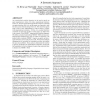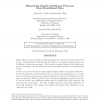498 search results - page 32 / 100 » A Formal Foundation for XrML |
122
click to vote
FINTAL
2006
15 years 5 months ago
2006
Abstract. Every language employs its own coordination strategies, according to the type of coordinating marking, the pattern of marking, the position of the marker, and the phrase ...
103
click to vote
ATAL
2010
Springer
15 years 3 months ago
2010
Springer
An organizational modeling language can be used to specify an agent organization in terms of its roles, organizational structure, norms, etc. Such an organizational specification ...
168
click to vote
ENTCS
2006
15 years 2 months ago
2006
Conventional approaches to the modeling of autonomous agents and agent communication rely heavily on the ascription of mental properties like beliefs and intentions to the individ...
129
click to vote
FLOPS
2010
Springer
15 years 8 months ago
2010
Springer
The logical framework LF provides an elegant foundation for specifying formal systems and proofs and it is used successfully in a wide range of applications such as certifying code...
108
click to vote
TOSEM
1998
15 years 1 months ago
1998
Many software process methods and tools presuppose the existence of a formal model of a process. Unfortunately, developing a formal model for an on-going, complex process can be d...


